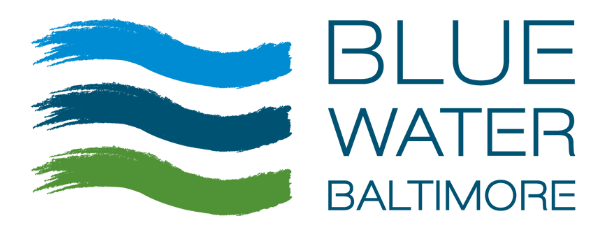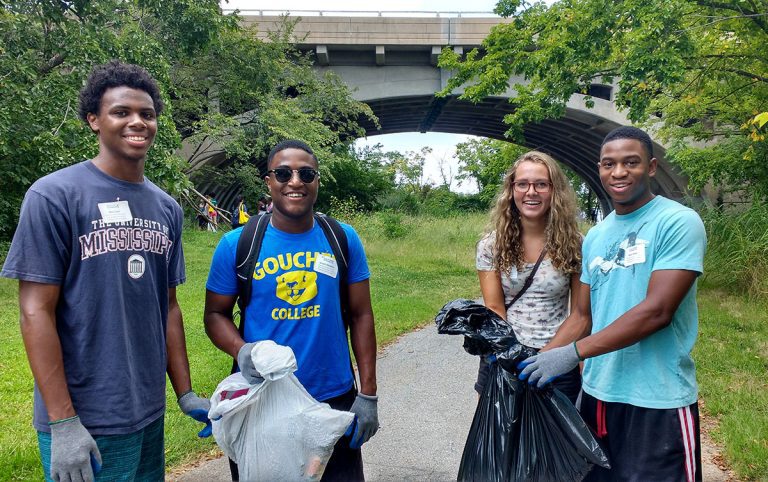The Life Of A Rain Barrel
Have you ever wondered where those blue and white barrels come from, those “rain barrels”? You may have heard that they’re recycled, but what does that mean? And how about “food-grade”? Come along for a trip from start to finish in…The Life Of A Rain Barrel!
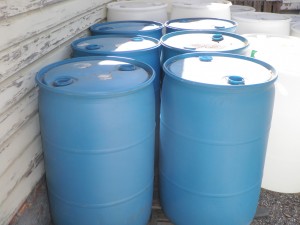
Let’s start with one of our most consistent sources of food-grade barrels, Phillips Foods. Phillips Foods uses a wonderful smelling California Sherry for some of their hardy soups, and the sherry comes to them in BPA-free plastic barrels, which can be used only once for sanitation reasons. Luckily for us, Phillips sees the connection between clean water and healthy seafood and generously donates their empty barrels to Blue Water Baltimore.
When a truckload has accumulated outside their shipping dock, Phillips emails us with a new offer. Leaving their headquarters in Locust Point with a vehicle smelling of wine, we take extra caution in obeying speed limits and traffic laws, lest we otherwise encourage suspicion with the smell emanating from the vehicle!
Back at our tool shed in Herring Run Park, we remove shipping labels and rinse out any remaining liquids from the barrels (yes, wasting the 2-10 ounces of wine each time!). One might think the next steps in converting these into rain barrels are quite easy, and that is correct…but certain steps need to be taken with JUST the right tools to insure an efficient, long-lasting rain barrel.
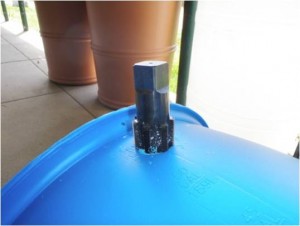
While you may intuit that a hole must be drilled for water to enter from your downspout, this hole should ideally be large enough for you to annually clean your barrel.
On top of this rests a filter basket not only to keep out debris, but also MOSQUITOES! Mosquitoes need 5-7 days of stagnant water to hatch. Should you encounter a hole in your basket over time, be sure to drain your barrel between rain events. Not only will this eliminate a breeding ground, but this will be 55 more gallons of stormwater reduction when the next rain hits.
Stormwater is the number one source of water pollutants from urban areas. Our rooftops intercept rainwater that would otherwise soak into the ground. Funneled into downspouts, this excess water often runs along streets before entering our streams and the Bay. In the process, this rainwater can pick up excess heat, oil, gas, and trash before entering our Bay untreated. Rain barrels, then, not only collect free water for your use, but reduce flooding, erosion and pollution potential by 55 gallons per storm. What if we all had a barrel? But on to our assembly…
So we have a filter basket. That’s good. We need a spigot or drain valve, yes? Thanks to local plumbing stores, we have tools called threading taps which actually thread the inside of the holes we drill so we can simply screw in our spigots. With the pressure of 440 pounds of water above the spigot, we’ll want to be sure we have a pretty darn good connection! We have water entry covered, a spigot for draining…anything else?
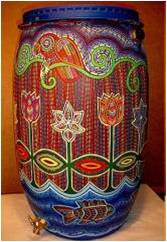
A common statistic is that a 1000 square foot roof, in a 1-inch storm, yields 600 gallons of stormwater! Converting that down to a 55-gallon rain barrel, the same size roof would fill it up with less than a tenth of an inch of rain! The average residential downspout, then, would fill one with less than one-quarter of an inch of rain. Anticipating storms larger than this, we add overflow hoses to redirect this excess water onto a permeable surface like a landscaped bed or grass. Should someone not have a permeable surface, we redirect this water back into their downspout. At the very least, 55 gallons were collected. Every drop counts!
Thanks to Philips and other donors, we can easily convert empty industrial food barrels into a water-saving, stormwater-reducing machine! Rain barrels are just one step you can take toward cleaner streams and a healthier Chesapeake, while giving yourself a convenient water source as well. Through our Water Audit program, we will install your rain barrel for free on top of offering a $25 rebate. Contact us to see if you qualify.
Better yet, RSVP for our next workshop on Saturday the 28th and receive $10 off the standard rain barrel price!
